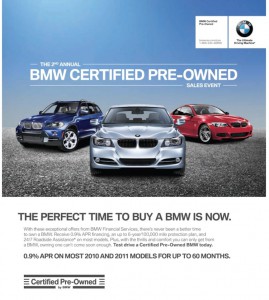Buying a used car has traditionally been a crapshoot, with a very uncertain outcome and little recourse if you pick the wrong vehicle. But the industry has tried to improve your odds – while earning a bit more money – with the introduction of certified pre-owned vehicle programs that have clearly clicked with consumers.
At the beginning of the new millennium, about 500,000 American motorists were buying certified used vehicles. That jumped to 2.1 million last year, and should hit another record for 2014, according to a study by auto sales site AutoTrader.com.
“Over the next few years, more than 9 million certifiable vehicles will be hitting the market, making now the time for consumers, manufacturers and dealers to pay close attention to the CPO landscape,” said Rick Wainschel, vice president of customer insights at AutoTrader.com.
How far is up isn’t clear, but through the end of September, industry sales data show Certified Pre-Owned, or CPO, vehicle sales were up 9.9% across the industry, with BMW and Hyundai showing 24% gains, while Ford, Mercedes-Benz and Nissan were all up at least 20%, as well. The rare exceptions to the upward trend were Honda, down 8%, and Toyota, which saw a 5% dip in CPO sales for the first three quarters of this year.
Toyota, nonetheless, was one of the industry leaders, selling 370,000 CPO vehicles in 2013, with Chevrolet and Honda selling around 250,000 each.
Industry analysts say it’s not difficult to understand the appeal of certified pre-owned programs. They focus on select products, typically cars, trucks and crossovers coming off-lease after just two to four years on the road, and with low mileage on their odometers. The vehicles go through extensive inspection and repair programs meant to bring them up as close as possible to like-new condition. They’re then backed with manufacturers’ warranties, and may get additional services, such as roadside assistance.
“New, CPO and used car shoppers all reported that the peace of mind that comes with purchasing a CPO vehicle is the key motivator,” said an AutoTrader summary of the study’s findings. “Affordability and the warranty also ranked within each shopper group’s top five reasons for considering CPO.”
(New vehicle buyers gobble up luxury cars, trucks and SUVs. For more, Click Here.)
The programs have a plus side for both carmakers and car dealers, as well. CPO vehicles typically go for more money than a regular used vehicle. And they have been shown to improve brand loyalty among used car buyers who traditionally might have just gone to wherever they found the best deal.
(Click Here for details on Ford’s Odell and Farley swapping jobs.)
“They are well-positioned to build long-lasting relationships with those consumers,” said Wainschel.
The message is clearly getting out, according to the AutoTrader study, an all-time high 75% of new car shoppers say they’re aware of such programs, while 45% of used vehicle buyers know about CPO programs.
About 30% of used-car buyers said they would consider a CPO vehicle, according to the latest study, up from 18% when the survey was conducted in 2013.
(To see why the Ram 1500 EcoDiesel captured Green Truck of the Year, Click Here.)
There is a potential downside, at least for automakers like Ford, Chevrolet and Toyota, however. A growing number of new vehicle buyers – 44% in the latest study, double the number in 2013 – say they might consider purchasing a CPO vehicle rather than sticking with a new car, truck or crossover.
On the other hand, motorists who buy a CPO vehicle are more likely to next trade in on a new vehicle, the research revealed.

